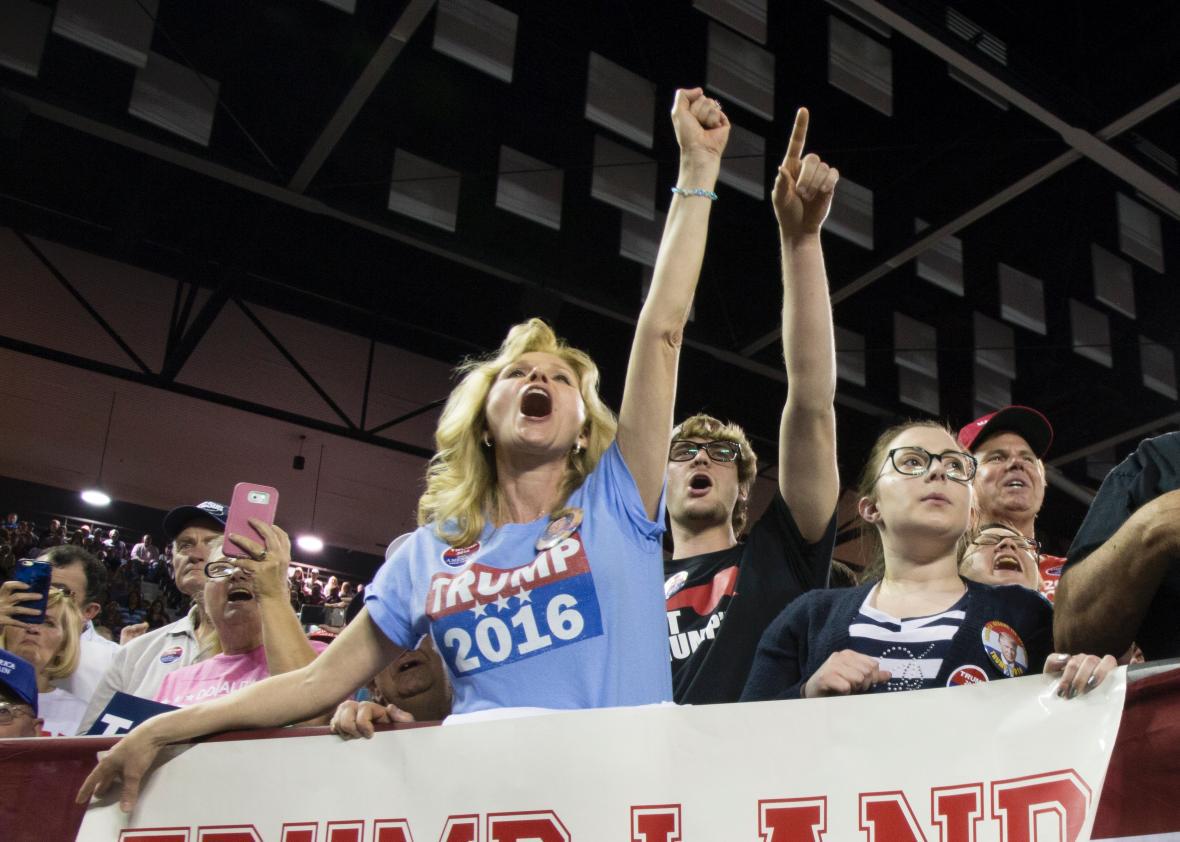For just a moment, it looked like Marco Rubio had a big win. When polls closed in Virginia, he was tied with Donald Trump, a surprise after a week of polls showing Trump with a double-digit lead in the state. But it was a false alarm. Trump had swept Virginia, along with Alaska, Arkansas, Georgia, Massachusetts, Tennessee, and Vermont. The only thing Rubio had to show for days of anti-Trump bluster was a modest win in Minnesota, called at the end of the night. If the Republican establishment went into Super Tuesday ready to fight Trump to the nails, they left it cowed and defeated. He’s not quite the presumptive nominee, but he’s close.
At the same time, it’s important to say that Trump didn’t win a majority of the Super Tuesday vote, or outperform previous leading candidates. The real estate mogul won 34 percent of all Republicans who voted on Tuesday, compared to 26.5 percent for Ted Cruz and 22.3 percent for Marco Rubio. This makes Trump less of a dominant candidate than Mitt Romney in 2012 (who won nearly 40 percent of the Super Tuesday popular vote against a wide field) and John McCain in 2008, who won 42 percent, against a smaller one of three opponents.
But Trump’s relative weakness doesn’t mean he’s vulnerable. While Trump isn’t as strong as previous front-runners, his coalition has a similar shape. Take Virginia, a varied state where Trump won with 34.7 percent of the vote. The Washington, D.C., suburbs aside, Trump won every region of the state, from exurban Northern Virginia and the central region of the state, to the vote-rich, eastern Tidewater and the Richmond metropolitan area.
More important than that, however, is the ideological and socio-economic shape of his coalition. Trump won “very conservative” and “somewhat conservative” voters in Virginia, and placed second with self-described Republican moderates. He won 39 percent of white evangelical Christians and 42 percent of people with military service. He won a whopping 47 percent of Virginia Republicans without a college degree, and most voters making less than $50,000 a year.
This pattern plays out everywhere. Trump dominates in the middle and downscale sections of the electorate, among Republicans who are “somewhat conservative,” and even those who identify as highly ideological. And while he has a difficult time winning new voters—few who decided in the past week broke to Trump—he won support early and held it in the face of attacks and pushback.
With a broad-based and durable coalition behind him, Trump can’t be easily stopped, even as he underperforms previous Republican front-runners. Things could change if the GOP consolidated around a single candidate (like Cruz, who won Texas and Oklahoma on Super Tuesday), but that understates the extent to which Trump might pull former Rubio or Kasich supporters into his orbit. He is a juggernaut, and he’s charging quickly to the nomination.
With that said, we shouldn’t mistake Trump’s strength in the Republican primary for any national advantage. While Trump’s moderate, conciliatory post-victory press conference sounds like an effective message in a general election, it’s also happening in the favorable context of a win, in a contest where—the past week aside—he hasn’t been bloodied.
Trump is still the man who called for the deportation of 11 million people, still the man who wants to ban Muslims from the United States, still the man who refused to disavow the Ku Klux Klan, still the man who was sued for discriminating against blacks and who called for the execution of the now-exonerated Central Park Five.
Put simply, he is a toxic figure with deep unfavorables among large swaths of the American electorate. And while he could appeal to disaffected white voters—blue-collar Democrats and alienated Republicans—there’s no guarantee he could do this without sparking a backlash among blacks, Latinos, Asian Americans, and a whole host of other groups offended and repulsed by Trump’s sexism, racism, and vulgarity. Nor is there evidence he could overcome the likely deluge of attacks on his dealings and business record, especially if high-profile Republican politicians begin to disavow him in the face of his nomination.
Anyone who wins a major party nomination can win the presidency. That doesn’t mean it’s likely. Trump is on the path to success in the GOP. But he’s still a long way from success with the entire American people.
